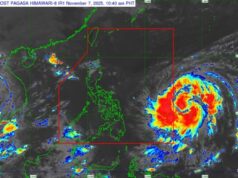Green rights group dubs Philippines as ‘deadliest’ in Asia

By Kyle Aristophere T. Atienza, Reporter
THE PHILIPPINES has remained the deadliest country in Asia for environmental and land defenders for a decade now, according to rights watchdog Global Witness, which noted that 11 of the 16 killings in the region last year happened in the archipelago.
Globally, the Philippines was the fifth most dangerous country for environmentalists in 2022, followed by Colombia with 60 killings, Brazil with 32, Mexico with 31, and Honduras with 14, the group’s latest report said.
Since 2012, a total of 281 defenders have been killed in the Philippines, a third of whom were “linked to defenders speaking out against company operations linked to the mining sector,” Global Witness noted.
Last year, at least 177 environmental defenders were killed, bringing the total to 1,910 since 2012 — a statistics that can be translated to an environmentalist being killed every other day.
“Although the overall figure is slightly lower last year than in 2021, when we recorded 200 killings, this does not mean that the situation has significantly improved,” the report said.
Global Witness said the climate crisis and the increased demand for agricultural commodities, fuel and minerals will “intensify the pressure on the environment” and “those who risk their lives to defend it.”
“Increasingly, non-lethal strategies such as criminalization, harassment and digital attacks are also being used to silence defenders,” it added.
Global Witness noted that President Ferdinand R. Marcos, Jr. has, so far, failed to address human rights violations since he took office in June 2022.
“Instead, he has focused his agenda on business and economic interests, raising continued concerns amongst civil society about an increase in mining and other resource exploitation at the cost of human rights and the safety of defenders,” it said.
The Marcos administration has eased rules for foreign investments in a bid to make the country an investment hub, welcoming foreign investors interested in mining and renewable energy projects, among other critical programs.
It has also created a green lanes program that requires national government agencies to fast-track the approval of necessary permits for investments that it considers strategic, covering projects that involve mining for key minerals such as nickel and copper, which are on demand as rich countries have been on race to manufacture solar panels, wind turbines, electric vehicles, among other technologies critical to a low carbon future.
But environmental watchdogs have warned that pre-investment requirements like environmental impact assessments and consent of indigenous and local communities could be ditched due to the investment program.
Asked about the report, the Department of Environment and Natural Resources (DENR) said it was not in a position to make a comment. “We don’t know the circumstances of each of the cases,” the DENR said in a reply to reporters.
However, it stressed that there are about 2,500 forest rangers, forest protection officers and other personnel at the provincial and community levels “who are also protecting the environment.”
Global Witness has cited the “widespread” criminalization of defenders and rights advocates, “with ‘red-tagging’ — the government practice of accusing activists of communist insurgency — commonly used to silence critics and communities.”
“The fact that the Philippines has remained the worst country in Asia for defenders for a decade now is nothing short of alarming,” Jon Bonifacio, national director of Kalikasan People’s Network, a coalition of green groups, said in a Facebook Messenger chat.
“While there’s been a lot of lip service around human rights and climate justice, the Marcos administration has not bothered to even comment or speak up about the human rights crisis our environmental defenders are going through,” he said.



